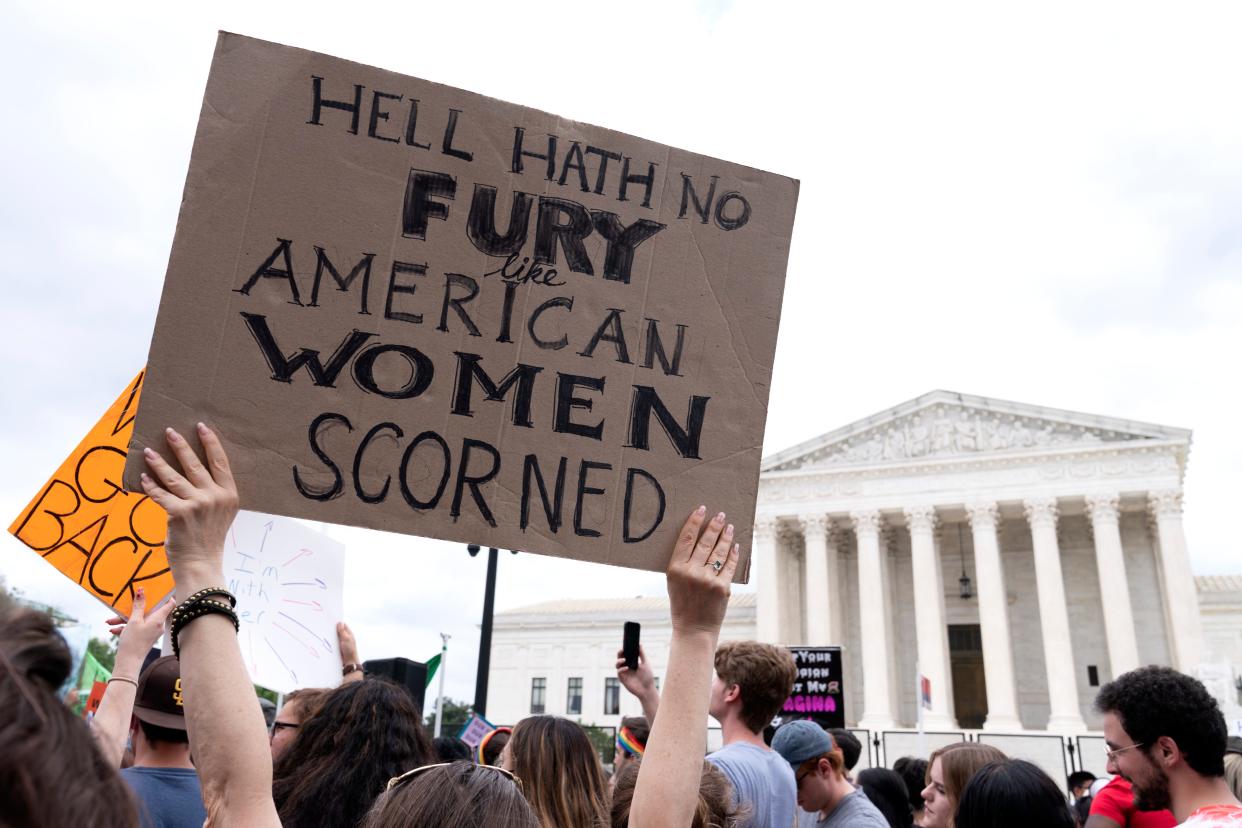This is America: 50 years after Roe v. Wade, activists remain hopeful

Like so many others, I will never forget the moment when news broke that the Supreme Court had overturned Roe v. Wade, the landmark decision that granted a constitutional right to abortion. I remember the flood of messages from editors coordinating news coverage and reporters scrambling to help readers make sense of what happened.
It was a moment we all understood was likely coming, but only later that night was I able to stop and reflect on how this may be one of the biggest news stories of my lifetime.
I spent the days after the decision writing explainer stories on "trigger bans" and medication abortion, and interviewing employees at abortion clinics who had to break the news to patients waiting for abortion care. Some told me of the screams and cries that erupted in waiting rooms.
In the aftermath of the ruling, abortion access was roiled back in large swaths of the country, and clinics began shuttering almost immediately. People began traveling long distances across state lines for abortions. And providers in states where the procedure remained legal were quickly overwhelmed.
It's impossible to hedge: The fall of Roe was an enormous victory for anti-abortion activists and a cataclysmic loss for abortion access advocates.
As we approach the 50th anniversary of Roe v. Wade on Sunday, the first anniversary since the ruling was overturned, I expected a mix of mourning, heartbreak, anger among abortion rights activists I interviewed. Those emotions were present, of course. But so was something completely unexpected to me: excitement.
I’m Christine Fernando, a breaking news reporter covering abortion and reproductive rights at USA TODAY. And you're reading "This is America," a newsletter centered on race, identity and how they shape our lives.
But first, stories we're reading this week on race, identity, and justice:
'We need to dream bigger': As Roe v Wade marks 50th anniversary, advocates push further
''It was a massacre'': Cheyenne and Arapaho leaders push to rename Oklahoma site.
Often interviewed, never hired: How hot-shot NFL head coaching candidates go cold.
Is it time to stop saying 'aloha' and other culturally sensitive words out of context?
Opinion: Tony Dungy shows his true values with hateful tweet that puts transgender kids at risk.
Why activists are excited despite the fall of Roe
Alison Dreith, director of strategic partnerships at the abortion fund Midwest Access Coalition, told me she felt "suspended in space and time" for days after the overturning of Roe v. Wade. Days later, she drove her truck to a cemetery, sat by her father's grave and cried.
Nikki Madsen, executive director of the Abortion Care Network, the national association for independent abortion providers, thought about her grandmother, who almost lost her life from an abortion prior to Roe v. Wade.
Mary Ziegler, law professor at the University of California, Davis, School of Law and a leading historian on the abortion debate, threw herself into her work after the ruling. But when she stopped to watch an interview of herself on the news with her husband and daughter, she started weeping.
When I spoke to each of them and others ahead of Roe v. Wade's 50th anniversary, I expected the same sense of mourning for abortion rights activists. But instead, they were already looking forward.
Organizers on either side of the abortion issue have long been primed to muscle forward amid the push and pull of the debate.
For the abortion access side, advocates say the 50th anniversary of Roe is an opportunity to reimagine abortion rights beyond the ruling, which they said did not ensure abortion access, especially for marginalized communities.
"It's an opportunity to expand abortion access in all parts of the country in a bold, visionary way that really centers abortion justice and doesn't leave our most vulnerable communities on the sidelines like Roe did," Dreith said.
What comes next?
Now, the fight continues as advocates on both sides look beyond the U.S. Supreme Court to state legislatures and courts, where dozens of cases are awaiting decisions this year and where new legal strategies are being used to challenge state abortion bans.
Medication abortion has also quickly become a major focal point in the debate. And state judicial elections are drawing attention for their potential impact on abortion access.
Yet advocates remain undeterred about the future of reproductive healthcare access.
"We have hope we can not only restore abortion rights but create a world where there's more access than there ever was under Roe," said Melissa Fowler, chief program officer at the National Abortion Federation.
Dig deeper on abortion access
A look at states: Post-Roe abortion battle draws attention to state judicial elections, new legal strategies
What New York City is doing: NYC becomes first US city to offer free abortion pills at sexual health clinics
Cases to watch in 2023: Eyes on states as challenges to abortion bans move through courts
What to know about medication abortion: Medication abortion may be the next focal point in the fight over abortion access
--
This is America is a weekly take on current events from a rotating panel of USA TODAY Network journalists with diverse backgrounds and viewpoints. If you're seeing this newsletter online or someone forwarded it to you, you can subscribe here. If you have feedback for us, we'd love for you to drop it here.
This article originally appeared on USA TODAY: 50 years after Roe v. Wade, activists remain hopeful

